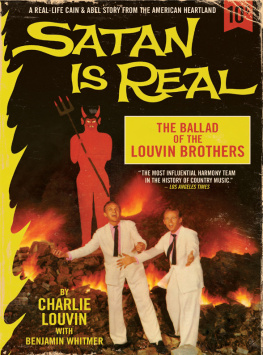Isaac Bashevis Singer - Satan in Goray: A Novel
Here you can read online Isaac Bashevis Singer - Satan in Goray: A Novel full text of the book (entire story) in english for free. Download pdf and epub, get meaning, cover and reviews about this ebook. year: 1996, publisher: Farrar, Straus and Giroux, genre: Non-fiction. Description of the work, (preface) as well as reviews are available. Best literature library LitArk.com created for fans of good reading and offers a wide selection of genres:
Romance novel
Science fiction
Adventure
Detective
Science
History
Home and family
Prose
Art
Politics
Computer
Non-fiction
Religion
Business
Children
Humor
Choose a favorite category and find really read worthwhile books. Enjoy immersion in the world of imagination, feel the emotions of the characters or learn something new for yourself, make an fascinating discovery.

- Book:Satan in Goray: A Novel
- Author:
- Publisher:Farrar, Straus and Giroux
- Genre:
- Year:1996
- Rating:3 / 5
- Favourites:Add to favourites
- Your mark:
- 60
- 1
- 2
- 3
- 4
- 5
Satan in Goray: A Novel: summary, description and annotation
We offer to read an annotation, description, summary or preface (depends on what the author of the book "Satan in Goray: A Novel" wrote himself). If you haven't found the necessary information about the book — write in the comments, we will try to find it.
Isaac Bashevis Singer: author's other books
Who wrote Satan in Goray: A Novel? Find out the surname, the name of the author of the book and a list of all author's works by series.
Satan in Goray: A Novel — read online for free the complete book (whole text) full work
Below is the text of the book, divided by pages. System saving the place of the last page read, allows you to conveniently read the book "Satan in Goray: A Novel" online for free, without having to search again every time where you left off. Put a bookmark, and you can go to the page where you finished reading at any time.
Font size:
Interval:
Bookmark:
Isaac Bashevis Singer Satan in Goray
First published in 1955
PART ONE
The Year 1648 in Goray
In the year 1648, the wicked Ukrainian hetman, Bogdan Chmelnicki, and his followers besieged the city of Zamosc but could not take it, because it was strongly fortified; the rebelling haidamak peasants moved on to spread havoc in Tomaszw, Bilgoraj, Krsnik, Turbin, Frampol--and in Goray, too, the town that lay in the midst of the hills at the end of the world. They slaughtered on every hand, flayed men alive, murdered small children, violated women and afterward ripped open their bellies and sewed cats inside. Many fled to Lublin, many underwent baptism or were sold into slavery. Goray, which once had been known for its scholars and men of accomplishment, was completely deserted. The market place, to which peasants from everywhere came for the fair, was overgrown with weeds, the prayer house and the study house were filled with dung left by the horses that the soldiers had stabled there. Most of the houses had been leveled by fire. For weeks after the razing of Goray, corpses lay neglected in every street, with no one to bury them. Savage dogs tugged at dismembered limbs, and vultures and crows fed on human flesh. The handful who survived left the town and wandered away. It seemed as though Goray had been erased forever. Only years later did its destitute citizens begin to return, a handful from each large family. Meanwhile, those who had been young men when Goray was devastated had turned gray, those who had been a power in the community were now clad in sackcloth and brought only beggars' bags with them. Some had left the path of righteousness, others had fallen into melancholy. But it is the way of the world that in time everything reverts to what it has been. Shops which had long stood closed behind rusted shutters opened one by one; bones were borne away to the untended cemetery, where they were all buried in one common grave; the flaps of booths were timidly lowered; apprentices mended the damaged roofs, repaired the chimneys, and painted over blood-and-marrow-splattered walls. With long poles, boys fished for human bones in dried-up streams. Gradually, the runners began to move again from village to village, buying corn, wheat, greens, and flax. The peasants in the surrounding villages had been too terrified even to set foot in Goray for fear of the demons whose dominion it was. Now they rode into town again to buy salt and candles, material for women's smocks and blouses, cotton kaftans and clay pots, and all kinds of necklaces and ornaments. Goray had always been isolated from the world. Hills and dense woods extended for miles about the town. Winters, the paths were the lurking-place of bears, wolves, and boars. Since the great slaughter the number of wild beasts had multiplied. Last of its citizens to return to Goray were the old rabbi, the renowned Rabbi Benish Ashkenazi, and Reb Eleazar Babad, formerly the richest man in the community and its leader. Rabbi Benish brought more than half of his family with him. He moved immediately into his old house, near the prayer house, began to supervise the observance of the laws of ritual diet, saw to it that the women went to the ritual bathhouse at the proper time, and that young men studied the Torah. The rabbi had left two daughters and five grandchildren behind in the cemetery at Lublin. He had lived in exile all these years, but misfortune had not changed his ways. He rose early, studied the Talmud and its commentaries by the light of a waxen candle, immersed himself in cold water, and recited prayers in the synagogue at sunrise. Rabbi Benish was in his sixties, but his skin was still smooth, he had lost none of his white hair, and his teeth had not fallen out. When he crossed the threshold of the prayer house for the first time after many years--tall, big-boned, with a full, round, curly beard, his satin coat reaching to the ground, the sable hat pulled down over his neck--all those sitting there rose and pronounced the blessing in thanks to Him who revives the dead. For there had been reports that Rabbi Benish had perished in Lublin during the massacres on the eve of the Festival of Tabernacles in the year 1655. The fringes of the vest that Rabbi Benish wore between his shirt and coat tumbled around his ankles. He wore short white trousers, white stockings, and half-shoes. Rabbi Benish grasped between his index finger and thumb the thick eyebrow that hung over his right eye, lifted it the better to see, cast a glance at the darkened, peeling walls of the prayer house and its empty book chests, and loudly declared: "Enough!... It is the will of our blessed God that we begin anew." Rabbi Benish Ashkenazi had inherited his office in Goray from generations of rabbis. He was an author of commentaries and responsa, a member of the court of the Council of the Four Lands, and was reckoned among the most brilliant men of the day. In former times many deserted wives had made the long trip to out-of-the-way Goray to receive permission from Rabbi Benish to remarry--for with all his learning and brilliance, Rabbi Benish was one of those who construed the Law liberally. Often emissaries had come to Goray from famous communities in an attempt to persuade him to accept coveted rabbinical posts--but all went away disappointed. Rabbi Benish wished to end his days in the place where he had inherited his office. And now he was home again. Miraculously, there had been little damage to his house. The two oaken book chests, once more filled with folios and manuscripts, stood where they had previously, along with the old-fashioned chairs covered in yellow satin, and the copper candelabra hanging down from the ceiling. Sacred volumes and writings were piled an ell deep in the attic. It was even rumored that somewhere in the house a clay man was hidden, a Golem that had once helped the Jews of that town in a time of persecution. Reb Eleazar Babad returned to Goray with only one daughter. The older daughter, the married one, had first been raped by the Cossacks and then impaled on a spear. His wife had died in an epidemic; Reb Eleazar's only son had disappeared, and no one knew what had happened to him. Since the first floor of his house had been wrecked, he moved into an attic room. In the old days Reb Eleazar had been famous for his wealth. He had dressed in silk even on weekdays. It had been the custom for a bride to be led to his house, where the wedding band would play in his honor. In the prayer house the cantor would wait for Reb Eleazar before reciting the Eighteen Benedictions, and on the Sabbath his household and the holiday guests dined at a table set with silver. Many a time the lord of Goray drove up to Reb Eleazar's in his carriage to pawn his lady's jewelry for gold ducats. But Reb Eleazar was now unrecognizable. The long, narrow body had bent like a candle, the wedge- shaped beard had turned ash-gray, the emaciated face was brick-red. Reb Eleazar's eyes, set close to his bony, peeling nose, now protruded, and seemed always to be looking for something on the ground. He wandered about wearing an old sheepskin hat and nondescript housecoat; a rope girdled his waist, his feet were wrapped in rags, like those of beggars. He never came to the prayer house to pray; he did his own housework, sweeping up, preparing food for himself and his daughter, and even going to the market to fetch a copper's worth of food from the women who sat near their carts. Whenever he was asked how he was getting along and how he had fared during the time he had been away, Reb Eleazar would shiver as though at some dreadful thought, would shrink into himself, look past his questioner's shoulder, and reply, "Why talk about it? What's the use?" Some said he was doing penance for his sins. Teme Rachel, the pious woman, added that once late at night she had passed his window and had observed him pacing back and forth and speaking aloud in a sad voice. Others whispered that he was out of his mind, that he did not take his clothes off when he went to sleep, and that he placed a long knife under his pillow nights, like a woman in labor, to keep away the devil. His daughter, Rechele, who was seventeen years old, had a lame left foot and seldom showed herself outside, preferring to remain hidden in her room. She was tall, with a greenish complexion, but handsome, with long black hair that hung down to her waist. In the early days after Reb Eleazar's arrival people had tried to arrange a match for her, because it was a pity for so old a girl to sit at home without a man. But Reb Eleazar did not answer the matchmakers, never said either yes or no, and they soon grew tired of useless talk. Besides, Rechele's behavior was strange from the beginning. When it thundered she would scream and hide under the bed. To the young wives and girls who came to call on her she said nothing, driving them away with her indifference. From early morning till night she sat alone, knitting stockings or merely reading in the Hebrew volumes she had brought from abroad. Sometimes she would stand at the window braiding her hair. Her large, dark eyes gazed beyond the rooftops--wide-open, brilliant, as though seeing things concealed from others. Though Rechele had a deformity, she aroused sinful thoughts in men. Women shook their heads when they spoke of her, whispering: "The poor lonely orphan... so feeble a child. And such a melancholy thing."
Next pageFont size:
Interval:
Bookmark:
Similar books «Satan in Goray: A Novel»
Look at similar books to Satan in Goray: A Novel. We have selected literature similar in name and meaning in the hope of providing readers with more options to find new, interesting, not yet read works.
Discussion, reviews of the book Satan in Goray: A Novel and just readers' own opinions. Leave your comments, write what you think about the work, its meaning or the main characters. Specify what exactly you liked and what you didn't like, and why you think so.








